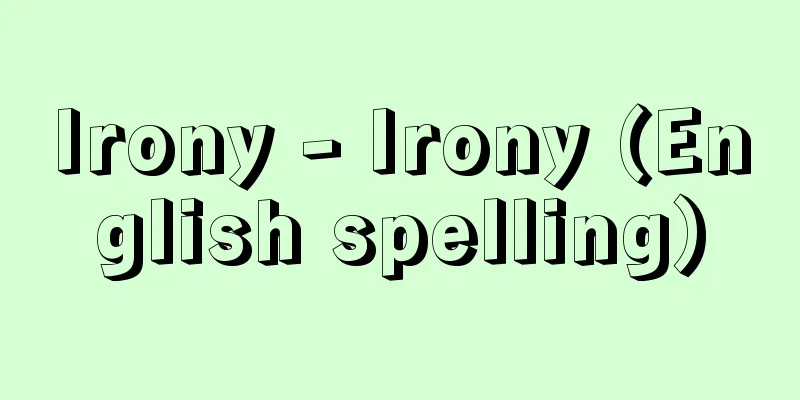Irony - Irony (English spelling)

|
In Japanese, it is translated as "irony" and is used to mean a roundabout criticism or insult, but in modern Western languages, it generally refers to a rhetorical technique in which an expression with the opposite meaning (for example, "You're a great man") is used to express the intended meaning (in this case, contempt for the other person). It is distinguished from a metaphor in that it is not based on an analogical relationship, and differs from a rhetorical question in that it does not reverse affirmation and negation but implies an opposing concept. Originally, it has a common etymology with the classical Greek eirōneiā, which means "deliberately feigned ignorance," and was often used to refer to the attitude of Socrates in Plato's Dialogues. Conversely, F. V. Schlegel proposed the concept of romantic irony to express the failure of the author's intention in a literary work. In theatre, it can mean that the outcome of a story is known to the audience but not to the characters (as in Oedipus), but by extension it can also mean an unintended ending ("ironie du sort") in general. [Tsuchiya Shun] [References] | |Source: Shogakukan Encyclopedia Nipponica About Encyclopedia Nipponica Information | Legend |
|
日本語では「皮肉」と訳され、遠回しの非難、当てこすりの意味で使われるが、近代西洋語では、自分の意図する意味と反対の意味をもつ表現(たとえば「君はたいしたものだ」)によって、意図する意味(この場合は相手に対する軽蔑(けいべつ))を表す修辞技法を一般にさす。類比関係に基づかないという点で比喩(ひゆ)とは区別され、また肯定、否定を逆にするのでなく、反対概念を意味する点で修辞疑問と異なっている。元来は古典ギリシア語で「意図的に装われた無知」を意味するeirōneiāに共通の語源をもち、プラトンの『対話篇(へん)』中のソクラテスの態度をさすことが多かった。F・v・シュレーゲルは逆に、文学作品において作者の意図が達せられないことを表すために、ロマン的イロニー(アイロニー)という概念を提出した。演劇では、観客にはストーリーの結末がわかっていても、登場人物にはそれがわからないこと(たとえば『オイディプス』におけるように)をさし、転じて一般に意図せざる結末(「運命のいたずら」ironie du sort)を意味することがある。 [土屋 俊] [参照項目] | |出典 小学館 日本大百科全書(ニッポニカ)日本大百科全書(ニッポニカ)について 情報 | 凡例 |
<<: Iron - Airon (English spelling) iron
Recommend
Kamiura
This is the former town area in the northeast of S...
Gakkeri [mountain range] - Gakkeri
…The Amersian Basin is further divided into two b...
Mykenai (English spelling)
An important archaeological site from the Mycenaea...
Japan National Railways Settlement Corporation
This special corporation was established to handl...
Cam type vacuum pump
...This pump can achieve a pressure of about 10 -...
Hans Böckler
1875‐1951 German labour activist and politician. B...
Megaloptera
…The order Neuroptera is divided into three subor...
Centulla
…This complex structure at the western end of the...
Moorhouse, F. (English spelling) MoorhouseF
...On the other hand, writers who are closer to t...
Naobi no Mitama
Norinaga Motoori's treatise on ancient ways. ...
Cassini's Law
…(3) The descending node of the Moon's equato...
Ofen
...After that, it flourished as a commercial hub ...
dragon
… [Ichiro Konan] [Japan] In Japan, dragons often ...
Kitsuki Domain
During the Edo period, this domain ruled the Kits...
Garlic (Hul) - Garlic (English spelling)
A perennial plant of the lily family (illustration...









